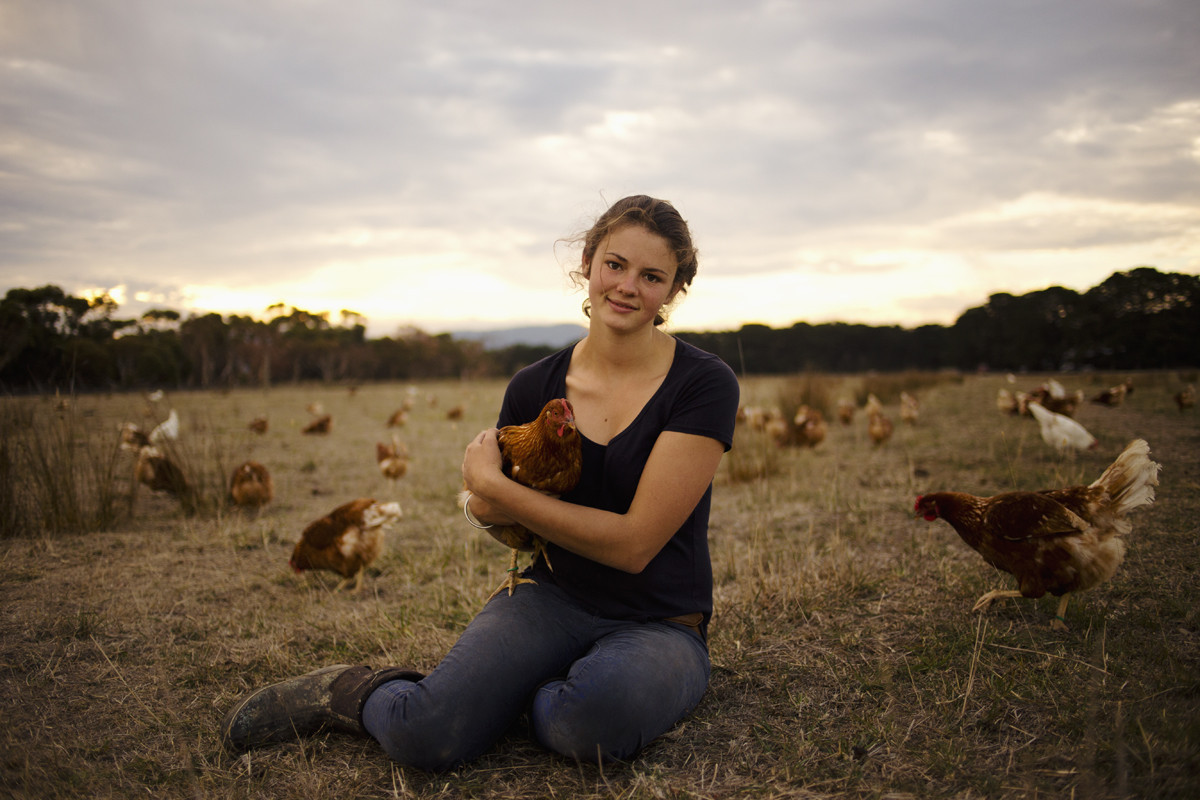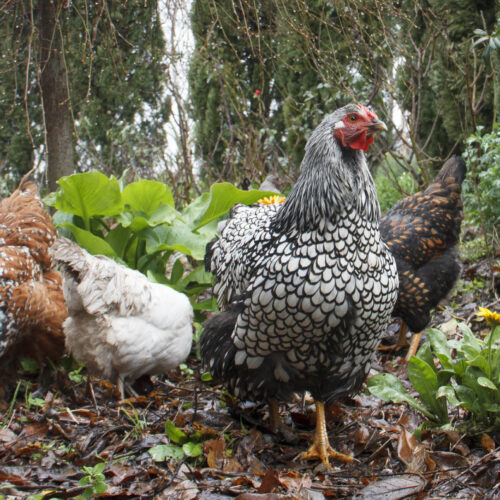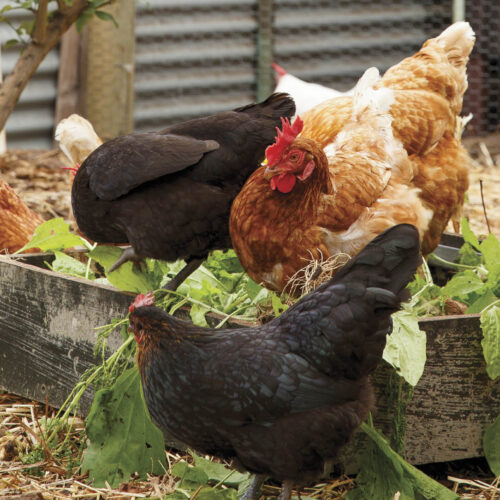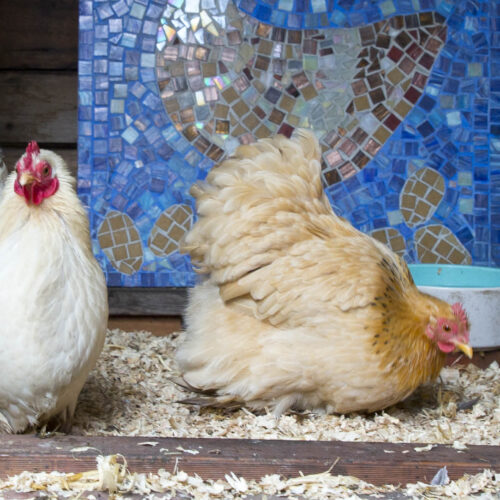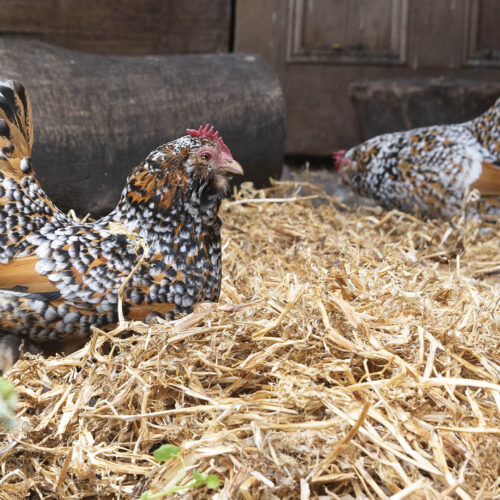A good egg
2015-12-23T22:59:53+11:00
Organic egg farmer and triple j 25 under 25 legend, MADELAINE SCOTT, shares her tips for quality egg production.
Like many other things in life producing good eggs is about doing the basics well. And a golden rule for quality golden yolks is a happy hen.
Madelaine Scott, organic egg farmer.
Growing up on 440 acres, Madelaine Scott has been organically farming chickens for eggs since she was eight. Her parents loaned her the money for her first 20 chooks, and she paid them back in no time. She’s now the proud owner of a flock of 2,000 chickens producing 700 dozen eggs a week. Majorly committed to promoting ethical farming, Madelaine’s business is certified organic — and impressively, she was a finalist for Egg Farmer of the Year 2015. “I’m promoting free-range and organic, and trying to be an example to the industry,” she says. “While I do make a lot less for the work I do, I’m a real health freak — I could never produce a product that had any chemicals in it.” To aid this mission, Madelaine managed to crowd-fund $68k in 60 days for an egg cleaning and grading machine. You can find her up at 4am once a week delivering eggs throughout Melbourne.
– triple j Annual 2015
Here are Madelaine’s tips for quality eggs.
1. The single most important factor in determining the quality of your eggs is hen happiness and like most organisms, getting a balanced diet with adequate levels of protein, carbohydrates, fat, vitamins and minerals, is essential. For laying flocks older than 16 to 20 weeks, I recommend a balanced organic layer ration. You may need to offer your birds higher-protein feed during times of high egg production and hot weather. Keep them outside with as much room as possible for access to a diverse mix of insects, grains, berries, seeds and plants in addition to their ration. Chickens will eat scraps but be careful what they consume as it may dilute the nutrients required for best egg production. For small scale, you can supplement their protein intake with solar lights to attract insects that will die at night and be eaten in the morning. If their egg shells are weak, have some shell grit available to help their digestion and provide valuable calcium.
2. Clean water is paramount, chickens will perish very quickly on a hot day without water and over half an egg’s volume is water. A gravity fed system can be very reliable, I use a solar pump and have hijacked the farm irrigation here but whatever you go for enjoy it as a chance to get creative.
3. Keep your chickens’ environment as dry as possible, excepting of course their water source. Sheltered, private, ventilated coops raised off the ground with easy access to nesting boxes, is the goal. Nesting boxes with a dry material, ideally sawdust, used as a comfortable place to lay their eggs will keep the chickens happy and saves you conducting an egg hunt every morning. Replace nesting material regularly. Avoid using hay, it retains lice and moisture and develops mould easily. Regularly replacing fresh litter in houses, preventing mud formation in pens, and raking up droppings will help prevent your birds from tracking faeces and mud into their nesting boxes and onto their eggs. Hygienic conditions promote healthier hens, as will paying attention to biosecurity issues, such as quarantine periods for new fowl and limiting visits to your farm/backyard from other chicken raisers.
4. Keep it clean! Not only with the chickens’ environment but with the eggs themselves. Collect eggs regularly, once a day is good. Not only is a freshly laid egg gorgeous, but it can go right into a carton and into a refrigerator, no scrubbing necessary. If you find them clean, there is no need to scrub them, as this will remove the invisible protective layer called the bloom, or cuticle. But, s**t literally happens, so to clean it off you may need to:
- Use fine, dry sandpaper and gently scrub off contaminants.
- Wet washing will work but avoid it if at all possible. If you have to, don’t use detergent, don’t use cold water and have them wet no longer than 5 mins.
- The very moment you collect eggs until you use them, store them SMALL SIDE DOWN in a dated container and keep them between 12 and 15 degrees Celsius. Don’t stash eggs with or near smelly foods, especially fish. When cooking with raw eggs, watch you don’t cross-contaminate and always cook them thoroughly, unless you’re Rocky Balboa!
5. Repeat. Large or small scale, farming is mostly maintenance. Nature follows cycles and the more you understand those patterns and apply them, the happier and more productive your hens will be. Try to find, buy and keep “The Biggle Poultry Book” as your poultry bible. It was first published in 1895, when “organic food” was just “food”.
View the full 25 under 25 list in the triple j Annual 2015. On sale now!

